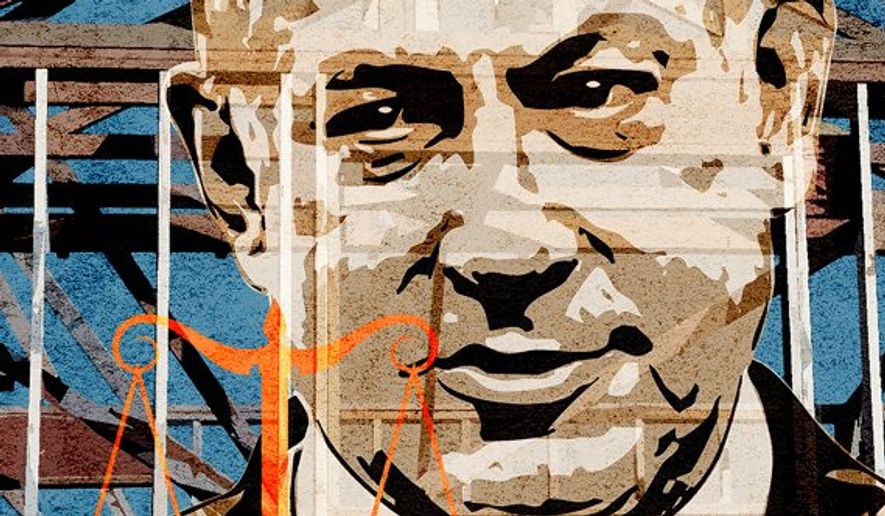OPINION:
Israeli politics have been dysfunctional for longer than a year. Prime Minister Benjamin Netanyahu won three general elections by so slim a margin that he couldn’t form a parliamentary majority. In January, in the midst of this, President Trump announced his peace plan for Israelis and Palestinians that effectively gave up on the “two-state solution” concept that has been the basis for the decades-long unsuccessful peace process.
One factor that helped create the political logjam is Mr. Netanyahu’s long tenure in office. He first held the prime ministership from 1996-1999 and has again since 2009. Mr. Netanyahu is a strong conservative leader but a significant part of the Israeli electorate may simply be tired of him. Mr. Netanyahu’s opponent, former Gen. Benny Gantz, fought three elections promising that he would not serve in a unity government with him. Out of sheer exhaustion, Messrs. Netanyahu and Gantz have now agreed to share power with the former still holding onto the top job.
Mr. Netanyahu went through the last election under a cloud of criminal corruption charges. The trial, which Mr. Netanyahu won’t be required to attend each day, will probably take at least two years. It began on May 24 with an arraignment in which he pleaded not guilty. It is the first time a sitting Israeli prime minister has been tried.
Mr. Netanyahu has taken a Trumpian stance, charging that the prosecution is purely political and aimed only at removing a conservative leader. At the courthouse for the arraignment, he said, “Elements in the police and prosecution joined together with the left-wing media in order to fabricate against me ridiculous cases to get the nationalist camp out of the leadership of the country.” That is probably true, at least in part, but that stance is unlikely to have much punch unless and until Mr. Netanyahu is acquitted of the charges against him.
One of the major issues in the most recent election was the annexation of about one-quarter — about 460 square miles — of territory on the West Bank of the Jordan River, a move suggested in the Trump peace plan. The area has been increasingly settled by Israelis among a large Palestinian population. Mr. Netanyahu proposes to annex the West Bank territory beginning in July. Mr. Gantz apparently has no ability to stop Mr. Netanyahu from going forward with his plan.
Mr. Netanyahu should not go through with his plan. National security is always Israel’s first concern and the national security analysis concludes against annexation.
Israel already effectively controls the Jordan Valley. Annexation will extend Israel’s eastern borders while making them less defensible. Much of the area proposed for annexation is Palestinian-owned. Some parts are devoted to farming. To the extent that the Palestinians own and farm the land, Israel would have to provide access through constantly-guarded paths or gates, placing increased strain on Israel’s defense forces.
Inevitably, and quickly, annexation would cause a surge of Palestinian terrorism against Israel. There is no anti-terrorist wall along the West Bank to protect Israel civilians.
Annexation will likely cause Jordan, which has a peace agreement with Israel and is Israel’s eastern buffer against Iraq and Iran, to withdraw from that treaty. Moreover, annexation will bring about 2 million bitter Arabs under Israeli sovereignty, as citizens, shifting the demographic balance against Israel’s Jewish majority.
Mr. Trump’s peace plan unwisely proposed just such an annexation by Israel. Providing for a four-year freeze on further Israeli settlements, enabling time for a “land for peace” deal, he promised $50 billion in investments in the Palestinian areas and, in some eventuality, a Palestinian state.
Predictably, his plan was immediately and forcefully rejected by Palestinian President Mahmoud Abbas. Mr. Trump’s plan is the direct and foreseeable result of the Palestinians’ continuous rejection of the best possible peace deals.
In 2000, a plan supported by then-President Clinton would have given the Palestinians a state in the West Bank and Gaza, but then-Palestinian President Arafat walked out of he negotiations. In 2005, then-Israeli Prime Minister Ariel Sharon dismantled Israeli settlements in Gaza and withdrew behind the Israeli borders that existed before the 1967 war. In 2008, Israeli Prime Minister Ehud Olmert offered a Palestinian state comprised of about all of the West Bank, all of Gaza and a divided Jerusalem to serve as the capital of both nations. Mr. Abbas walked out of those negotiations.
Mr. Trump’s plan implicitly recognizes that the Palestinians cause depends on continuous conflict with the Israelis. It is, in part a political struggle, but more importantly to the Palestinians, a religious conflict.
Israel and the United States have exhausted the peace process begun in the 1993 and 1995 Oslo Accords. The Palestinians have proved themselves unwilling to accept any peace treaty that would end their total opposition to Israel’s existence. The answer to that is not annexation but to ignore the Palestinians except to take effective measures against their terrorism.
Mr. Netanyahu, weakened by repeated elections and his criminal trial, is not so weak that he has to annex part of the West Bank to satisfy Israel’s settler community. His political position could improve if he decided against it.
Mr. Trump should rethink his peace plan and urge Mr. Netanyahu to cancel the annexation plan. Israel will be safer and stronger if he does.
• Jed Babbin, a deputy undersecretary of Defense in the George H.W. Bush administration, is the author of “In the Words of Our Enemies.”




Please read our comment policy before commenting.